
Frankly, a lot of so-and-so-at-local-event photos don't do much for me. (Exception: Good concert footage.) But Libby Lewis's shot of Michael Chabon would look snazzy even if Mr. Chabon hadn't been in town. Kudos, and thanks to her and Seattle Arts & Lectures for dropping this shot in our Flickr pool.
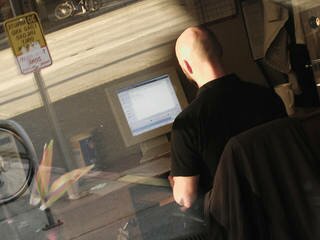 Sure you have a firewall, but what about people photographing you through the window? Thanks to Flickr pool member mangpages!
Sure you have a firewall, but what about people photographing you through the window? Thanks to Flickr pool member mangpages!
It's like the Los Angeles Times only cares about Seattle if we're jumping off bridges or exposing ourselves to cybercrime. The story now is one of those virally successful PR efforts, based on computer crime busters Symantec rating 50 U.S. cities "using 24-million security sensors that monitor malicious-attack activity around the globe."
They counted up PC attacks, viruses and worms, and bot-infected computers used to send spam or transmit malware, checked the frequency of the attacks, and weighed behavior like connecting to public Wi-Fi shopping online without a secure connection.
Says Symantec, Seattle is top of the charts on almost every risk factor. But let's take this with a grain of salt. I asked Mark Rushing, systems analyst and open-source pusher at Orbis Lumen, for his take. Mark would have wanted to confirm that we're talking about actually illegal acts, rather than the sexy, all-purpose "cybercrime," and to know more about the role of false positives in "attacks" reported by virus software. But here are his initial responses.
So, cybercrime mecca Seattle: hooey or not hooey?
Probably a little of both. It's marketing. You're supposed to be scared and buy Norton/Symantec products. I notice that Fox News seems to have taken the largest interest in this story.
Is security even possible any more?
Complete security has never been, and will never be, possible. You can only take precautions. The more precautions you take, the more inconvenient and impractical your experiences can become. And interestingly, the more privacy you seem give up.
What are some basic precautions people just don't "get around to"?
The best protection is increasing your awareness. If you want to be safer, you must be aware of your environment. Learning is the best thing you can do. Alas, people prefer packaged conveniences, it seems, so they buy Norton/Symantec products, or buy AVG products (or use their free one). But this lets them observe all you and your computer is doing.
Better to use an operating system that is based upon best practices in the underlying science and technology, rather than predominantly marketing forces. Your conveniences always come at a cost, and those conveniences are rarely the best (and often not even the simplest) way to do things.
And of course, don't use the same password for every site. Use unique, harder passwords for sites with access to your bank accounts. Don't install software from places you do not know or trust. Etc., etc....

Great Beyond shared this photo of "typically trippy Fremont sculpture," which if I recall correctly is across the street from the north end of the Fremont Bridge. (Also note: shot on film!)
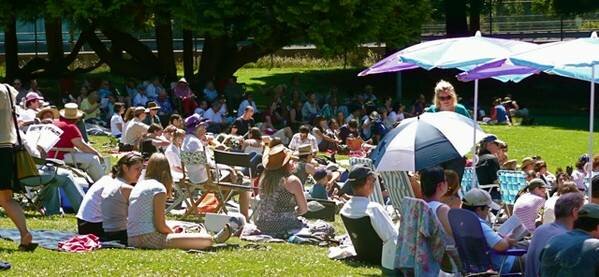 Gun-free summer theatre at Volunteer Park.
Gun-free summer theatre at Volunteer Park.
U.S. District Court Judge Marsha J. Pechman ruled in favor of the City of Seattle against plaintiff Robert Warden, of Kent, and dismissed his case. Warden had brought suit against the city and Mayor Greg Nickels for banning guns in parks, arguing that the state constitution expressly prevented that limitation. The King Co. Superior Court agreed in February, calling the ban illegal.
But here's where it gets interesting: Warden's success in that case rendered his complaint moot in U.S. District Court. So he couldn't argue the more straightforward claim that the state constitution preempted local law. ("The court was presented only with the issue of state law preemption, and here Plaintiff expressly removed his preemption claim from his complaint," wrote Pecham in her decision. )
So Warden was left arguing Second and Fourteenth Amendment issues. Pechman countered that the Second Amendment does not (yet, there's a case coming before the Supreme Court) constrain the actions of municipalities like Seattle, only Congress. And she did not find Warden discriminated against. Warden was able to cite no inalienable right to carry a gun in a park.
Pechman moved on, though, to give her thoughts as to the legitimacy of the preemption argument anyway. In her view, there's precedent for a parks gun ban:...
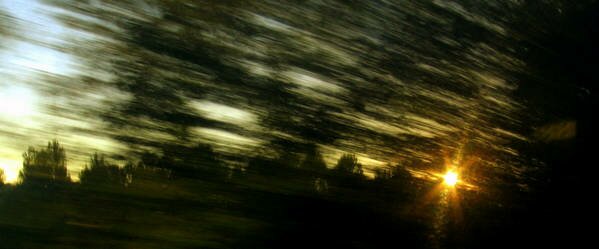 Sunset on the Portland to Seattle trip
Sunset on the Portland to Seattle trip
President Obama's plug for high speed rail in the State of the Union address was followed by AP reporting, tonight, that Washington state is one of the thirteen major corridors in line to see faster service: in our case, from Seattle to Portland.
Sen. Patty Murray says we will receive $590 million, and extra Amtrak trains. Seattlepi.com say the improvements on the Seattle to Portland line will allow Amtrak trains to pass BNSF freight trains, the slowpokes that often cause delays currently. The ultimate goal is a top speed of 110 mph.
You've probably spent a lot of time the past week watching video and photos, reading news articles and tweets about the Haiti earthquake. You've felt sorry for the Haitians, aghast at the scenes of death and ruin, and agonized over the condition of the survivors. But you probably haven't imagined anything remotely similar happening in the Seattle area.
Back in June 2005, a half year after the earthquake and tsunami in Southeast Asia, and over four years after the Nisqually earthquake, the Earthquake Engineering Research Institute and the Washington Military Department brought out a "Scenario for a Magnitude 6.7 Earthquake on the Seattle Fault."
That is, an earthquake slightly lighter than what struck Haiti last week, and one that would come on the Seattle Fault, which runs through south Seattle, Mercer Island, Bellevue, and the Issaquah area. It wasn't pretty: the vision of the aftermath of a 14-mile surface rupture running roughly parallel to I-90 involved over 1,600 dead, another 24,000 wounded, $33 billion of damage, and months of transportation problems for Puget Sound.
The scenario said a 6.7 Seattle Fault quake will cause damage "far worse and more extensive than seen in any earthquake in the state's history."
"The viaduct will be heavily damaged or collapse," in a way very similar to how Oakland's Cypress Viaduct pancaked in the Loma Prieta quake, Boeing Field "will experience significant liquefaction" on its runways and close for several days, the Seattle ferry terminals "will shut down for at least a week due to damage from ground failures and failure of the seawall," and we'll see a lot of the brick buildings in Pioneer Square tumble, along with a lot of the concrete warehouses south of downtown....
Seattle squirrels even pitch in on recycling.
Despite the obvious "fixie gap," when Sightline added up greenie points for the Northwest's (they call us "Cascadia") three largest cities, Seattle came in ahead of Portland. Vancouver, B.C., was greenest of them all but that is to be expected, as they are Canadians and don't have money to waste.
Sightline's Alan Durning says our northern neighbors have:
...the highest urban density, the most cycling, the most walking, the most transit ridership, the fewest cars—and the least driving—per person, the lowest greenhouse gas emissions per capita by far (thanks to its car-lite ways and to its carbon-free electricity), the lowest teen birth rate and family size, the highest life expectancy, and the lowest poverty rate.
Overachievers.
Portland, the conventional wisdom runner-up, with those green jobs and sustainable development, may have been resting on their laurels, unwisely focusing on growing facial hair, getting sleeve tattoos, and loading up on terrific places to eat brunch. They took their eye off the ball. And now they are paying the price.
In health (we live three years longer), economy (well, we knew that), sprawl (on a city-limits basis Seattle is more compact), and energy (hydropower + walking = win!), we lead Portland. We're tied on population replacement.
(Now, to be fair, there are other ways of contrasting the two cities. Portland has an NBA team and an income tax. Seattleites pay sales tax and watch the Sounders.)
But we can't let our second place achievement go to our heads. Durning closes by pointing out that none of the three cities is close to "sustainable." We still have super-size carbon footprints, still pollute like crazy, and still run through natural resources faster than they can replenish.
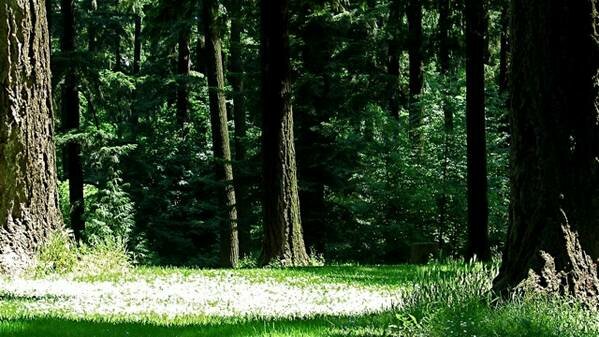 Trees at risk: each year, 200,000 trees just like the ones in this grove, go to the blade for junk mail.
Trees at risk: each year, 200,000 trees just like the ones in this grove, go to the blade for junk mail.
When the U.S. Congress passed the National-Do-Not-Call-Registry into law in 2003, and improved it in 2007, it became one of the most popular government programs in our nation's history. Almost overnight, the Registry stopped millions of obnoxious calls from interrupting the average American's dinner or Saturday morning sleep-ins. It wiped out the most intrusive, unwanted, and annoying communications development since Alexander Graham Bell implored Watson to "Come here, I want to see you."
I say nearly, because the DNCR left a few loopholes that continue to annoy us all. Exemptions for non-profit organizations and political calls continue to be allowed. This is a problem, but make no mistake: The Registry has been a stunning success that's allowed many of us the chance to eat our meals in peace.
Now the Seattle City Council has the chance to right a litany of wrongs when they vote on a resolution to petition the state legislature to ban junk mail. The council will vote for the resolution to create a Do-Not-Mail-Registry on January 11.
I could reel off a massive list of environmental reasons it's a good idea. The appropriately, and somewhat humorously-named group ForestEthics sent around a blast email to local media chock full of the "environmental impacts" of the local junk mail trade. For the ultimate guilt trip, consider these factoids:
- Almost 200,000 trees are cut for Seattle's junk mail every year
- Junk mail sent to Seatteites causes global warming gases equal to almost 6,000 cars, due to logging and industrial emissions
- It costs more than $400,000 a year to dispose of Seattle's junk mail.
That cleanup total, by the way, is paid by us through taxes. So every day my wife pulls the junk mail out of the mailbox and throws it into the recycle bin in one deft move, it's costing us money....
Here is the tempest in a macchiato thus far: A new Capitol Hill pocket park, at the corner of East John Street and Summit Avenue East, was to be named Perugia Park. The Park Naming Committee suggested it to honor the sister city relationship between Seattle and Perugia. It seems they also meant to pour some honorific oil on the waters agitated by the Amanda Knox trial--they just didn't come right out and say it.
The tin-eared announcement was made by people trying to duck the symbolism they chose. Parks officials seemed to think they could safely decree what the park stood for--the sister city connection--and nothing else. The public backlash was immediate, and Parks Superintendent Tim Gallagher has tabled the naming process until the spring.
The Seattle Times op-ed page, no stranger itself to tin-eared decrees, has weighed in, declaring Perugia "not a bad place," but concluding that "[f]or now, the parks department should abandon the plan and find another more suitable name." (The Times' Nicole Brodeur also thinks Seattle Prep's Amanda Knox fundraiser is in poor taste because "it's likely making some people angry and uneasy." These people, for the record, seem to be residents of Brodeur's imagination--no one is quoted.)
It would be a mistake to confuse public upset with bad communication skills with real animosity toward Perugia. I can't imagine a huge outcry to the Parks Department announcing that the name, in recognition of the stress and strains of the Amanda Knox trial, commemorates our sister city. What people objected to was not a Perugian taint or the timing, but the murky motivation.
Name Perugia Park. Be clear about the reason--that especially now, Seattle and Perugia need this symbol of friendship and understanding. And challenge the vindictive and axe-grinding--and the few who stir the pot whenever they get the chance--to say otherwise in public.
Two months ago when I previewed Seattle University's season, I tried to make the point that SU forward Charles Garcia was among the most athletic players in the country, let alone among D1 independents like Seattle U. In doing so, I made a throwaway joke that has inflamed passions on the Charles River, and even reached ESPN.
My comment was this: Garcia "will be the most talented player on the floor in many of SU's games this year (especially against Harvard)." Because Harvard sucks at basketball. Ha! Mmm, not my best work.
I admit that before I made that comment, I had not actually asked NBA scouts to assess the talent on Harvard's roster, or watched their game tapes, or even bothered to read anything whatsoever about the Harvard basketball program. Instead my joke relied on the fact that HARVARD HAS BEEN SO TERRIBLE AT BASKETBALL THE LAST TIME THEY PLAYED IN AN NCAA TOURNAMENT GAME IT WAS 1946 AND THEY LOST TO NYU.
Had I been a better blogger, I would've noted that Harvard has a player named Jeremy Lin who is a pretty talented basketball player--and at this moment a better one than Garcia, as he displayed in Saturday's blowout win at KeyArena over Seattle U.
Lin (according to the Harvard site, his "house affiliation" is Leverett, whatever the hell that means) displayed terrific body control around the basket, and was unstoppable in the open court. Garcia struggled to find rhythm on offense, and committed a silly foul on defense that staunched a Seattle U comeback.
Lin probably could be a decent pro somewhere, and he's getting extra notoriety due to the fact that he's Asian-American and even in post-racial ObamAmerica, a stellar Asian-American basketball player is pretty rare. Although if someone could point out the last decent Norwegian-American basketball player I would much appreciate feeling that despite having an 11-inch vertical I might someday get to the League.
I really would like to see Harvard make the tournament, if only to say that my alma mater--yes, I'm an NYU Violet--was their last tourney loss. But if so, will we have to hear whiny, entitled Harvarders (or whatever) complain about a lack of respect for their basketball team? If so, I suggest that the Crimson can stay home....
I like to keep the Christmas tree up until I have an epiphany sometime around January 6 ("Hey, this thing is brown and dead and shedding needles everywhere!"). But I realize that in our modern world things happen on a faster schedule. For many people, Christmas is over December 26, and that tree has got to go.
Happily for the environment, in Seattle and all throughout King County you can "tree-cycle," if you haven't flocked it and are not too lazy to remove tinsel and other ornamentation. King County guidelines look less strict than Seattle (they won't accept trees over eight feet). In Seattle, we're more precise about our Christmas tree recycling:
The tree must be less than 4 inches in diameter, and trimmed to 6 feet tall and 4 feet across. Clean trees can also be taken to the Transfer Station for free. If tree is flocked, it must be disposed of as garbage: Cut into pieces in your garbage can, or take to the Transfer Station.
Artificial trees, of course, are not included in the recycling program: "Artificial trees will last for six years in your home, but for centuries in a landfill."
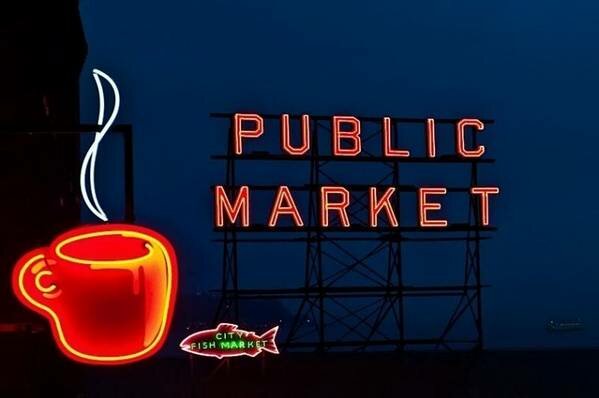 "Oh -- Seattle" by Paul Swortz from The SunBreak Flickr pool.
"Oh -- Seattle" by Paul Swortz from The SunBreak Flickr pool.
Okay, Seattle, this is it: You have roughly 60 hours in which to complete your shopping before Christmas is all over you. We know there's someone you haven't figured out what to get yet, and there's surely someone who's slipped off your list that you're going to remember Wednesday at 8 p.m. and freak out. So The SunBreak--with the help of some knowledgeable friends--is here to help: this is our desperate, last-minute gift guide of the more or less local variety. Support local businesses and take all that pesky thinking out of holiday shopping!
A Cinematic Gift That Keeps on Giving Plenty of films are made in the Great Northwest these days, and plenty of them suck. The easiest way to become familiar with what's worthwhile and what's best forgotten in terms of local (and non-local) cinema is by becoming a member of the Northwest Film Forum. NWFF is a member driven collective that does more than pretty much anyone else to support film in the Northwest, as well as bringing the best independent films to town. Membership starts at $40 a person (or $70 for a couple), and gets you great discounts to shows, as well as lets you help support the cinematic arts in the region. (Jeremy M. Barker)
Just Plain Nuts Holmquist Hazelnuts are absolutely delicious hazelnuts grown in Lynden, Washington. Available at the Pike Place Market and several Farmers' Markets. (Rachael Coyle)
Mariners Merch After a few years in the wilderness of mediocrity (or worse), the Mariners are looking like contenders again. Hit Safeway or a Mariners Team Store for Mariner gift cards your M's fan friend can buy tickets and gear with; or go balls out and put a deposit down on a 16-game plan. (Seth Kolloen)
Chocolates Falling in the delicious territory between completely useless and entirely practical (you do need calories, even if they're near-empty), chocolate makes a good gift for just about everyone on your list. An obvious and elegant choice is the Obama-endorsed Fran's, where the gray and smoked salt caramels is a classic minimalist delight. At this point, their website looks overloaded; so last minute purchases will need to be made in person. For the more ecologically conscious sweet tooth, look no further than Theo the country's only organic, fair trade, bean-to-bar chocolate factory. They have single origin bars, inspired artistic truffles, chipotle sipping chocolate, and even a vegan option or two. Order online or sample the goods in their Fremont factory. (Josh C. Bis)
Rock Musics I'd happily recommend any of my favorite albums of 2009: Curse Your Branches by David Bazan (questions about the reason for the season); Listen to the Thunder by The Maldives (best paired with The Moondoggies Don't Be A Stranger and a bottle of whiskey); and a personal favorite, one of the most underrated local albums of 2009: Space Between The Maps by The Ironclads (for fans of complex character-driven pop songs). (Abbey Simmons, SoundontheSound.com)...
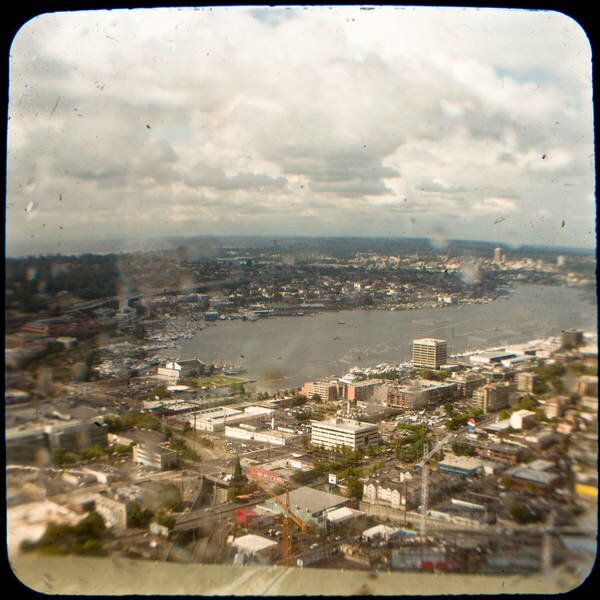 "Lake Union" from the Space Needle, courtesy of The SunBreak Flickr pool stalwart Slightlynorth
"Lake Union" from the Space Needle, courtesy of The SunBreak Flickr pool stalwart Slightlynorth
Zeitgeist, Google calls it. For me, the list echoes of Lawrence Durrell's Spirit of Place. These are ten search terms that are unique to Seattle in their popularity. Some need no explanation, like the leader "sounders fc." The Sounders Football Club has singlehandedly brought back scarf-wearing to Seattle sports fandom, if that gives you any idea. I think they could bring back umbrellas! Seriously.
But what about "bellevue college"? Yes, Virginia, there really is a college in Bellevue (previously Bellevue Community College). In 2008-09 it conferred its first Baccalaureate degrees. It's the third-largest higher learning institution in Washington, that's all. 37,000 people attend.
Next we have "seahawks 2009 schedule." What does that tell us? That the Seahawks play San Francisco this weekend, for one thing. But more importantly, we learn that Seattleites are prone to rubbernecking at train wrecks. Can't help themselves.
Next! Let's take a trip to the "snoqualmie casino," with its daily blackjack tournaments, 1,700 slot machines, and ten poker tables. It's 170,000 square feet, with eight restaurants, lounges, and bars. There's an 11,000-sq.-ft. ballroom. Michael McDonald is going to appear there this weekend.
Here is something historic: "west seattle blog" is fifth on the popularity list. It is the only time that West Seattle has been fifth at anything! Tracy Record and Patrick Sands run the blog night and day, and have full-time since Tracy left KCPQ in December 2007. Today they have great shots of the moonrise from West Seattle.
I think it has to be another record that "uw libraries" makes the list. Libraries in Seattle enjoy the fame and adulation that, say, Studio 54 did in New York. A lot of you can recall Suzzallo and Odegaard without hesitation, but what about the Miller Horticultural Library? What about the K. K. Sherwood Library at Harborview? The UW libraries contain 7.14 million volumes.
I don't imagine I need to spend much time on "myuw.com." Big research university, brings in about $1 billion in grants annually, has over 4,100 full-time faculty and almost 50,000 students, there's a football team....
I'm in the market for an Enhanced Driver's License (EDL) because of my lifelong dream to get around to taking Amtrak up to Vancouver. So I have a trip to the DMV in my future. My dealings with the DMV always seem to involve moments where I ask myself, "Are they serious?" It turns out they usually are, so that hard-won knowledge I pass on to you.
Since the approval of the Western Hemisphere Travel Initiative (Slogan: "You can still travel around the Western Hemisphere, it just takes a lot more personal initiative!"), Washington residents need either their passport or EDL to visit Canada (and Mexico, Bermuda, and the Caribbean).
Seattle residents have two EDL choices: the downtown DMV office or what's charmingly known to the DMV as Seattle-West. At the Seattle-West (known to locals as "West Seattle") location, they only take walk-ins for EDL applications, and stop taking applications 30 minutes before closing (closing weekdays is 5 p.m., Saturday, 2:30 p.m.).
Downtown, they only take appointments (call 1-866...
It's a squeaker! Mike McGinn still leads Joe Mallahan, but by just 462 votes. City Council races are not so close: Richard Conlin, Sally Bagshaw, Nick Licata, and Mike O'Brien all have comfortable leads over their rivals. Pete Holmes has still soundly thrashed Tom Carr in the city attorney's race. Full results are here. More updating this time tomorrow, and tomorrow, and tomorrow, until the last syllable of recorded time. I don't agree with Susan Hutchison on that much, but waiting for all the mail-in ballots to arrive is anti-climactic.
Shot of the Dow Constantine election party around 10:30 p.m., by Seth Kolloen
As SunBreak editor Seth Kolloen continues making his way through the detritus of 101 election night parties in Seattle, I've returned home to the comforts of hot tea and cats to bask in the warm glow of a good night. While the verdict is still out on both the mayoral race and Referendum 71, Seattleites can at least half-relax in the knowledge that they've done well tonight.
The success of the Mike O'Brien-Pete Holmes-Mike McGinn ticket (should McGinn's lead hold) is good news for Seattle, and not just because I agree with their policies. And the groundwork for their success was laid over the last decade, by a dedicated core of activists who nearly (or actually) burned themselves out fighting the prevailing winds on transportation issues, like Cary Moon and Grant Cogswell.
These candidates' success shows that progressives and environmentalists in Seattle can prevail in a one-party climate, which stands in marked contrast to the rest of the country. No doubt John Corzine's defeat in the New Jersey gubernatorial election is already being used as right-wing fodder to suggest the public is turning against President Obama's policies, when in reality it's owed mostly to the corrupt, ossified political culture of New Jersey Democrats.
The Seattlepi.com's description of McGinn's campaign as "populist," while charming, is a disservice. McGinn's success, like Pete Holmes's and Mike O'Brien's, is owed to the fact that he ran on solid policy positions that both appeal to the city's sensibilities while constituting sound, far-sighted choices. While Mike McGinn has backtracked on his opposition to the tunnel, his potential election signals a departure from the failed tenure of Greg Nickels and breathes new life into the city's liberal political culture.
Susan Hutchinson's once-competitive campaign was owed largely to the public's increasing lack of faith in the local Democrats. She was an attempt to hitch the radical, anti-environment policies of the ex-urban fringe to a candidate with suburban appeal. Dow Constantine's decisive victory should put to rest idle talk of the region swinging to the political right. And while it's unlikely to put to rest the town-country divide and the attendant vitriol that was aimed at Ron Sims for his environmentally sound land-use policies, the fact that Sims's protege has prevailed clearly signals that the majority in the region understand that the value of our natural resources justifies the inconveniences.
Pete Holmes's victory is especially pleasing. Tom Carr was fundamentally out-of-step with Seattle in his longstanding battle with the city's thriving night-life. Not only has Seattle unequivocally stated that it believes there's a better way to balance neighborhood quality-of-life with a thriving bar and club scene, but it has spoken strongly in support of the cultural scene--the theaters, rock clubs, galleries, and literary events--that's so closely tied to night-life.
Tomorrow, most commentators will be talking about how King County's overwhelming support for the Approve 71 campaign (roughly two-to-one in favor) played a decisive role in likely swinging the entire state (where it's tentatively passing 51-49 percent), but that's also unfair. Sixty-five percent of King County voters are not pinko commies. The success of the Approve 71 campaign is owed to great outreach to voters of all stripes, and the ability of gay rights advocates to convince the larger community that gays are your friends, neighbors, and co-workers, and at the very least deserve most of the rights and privileges afforded to their straight neighbors.
Oh, and as for Tim Eyman's failure to pass his latest anti-tax initiative? It means nothing except that the vast majority of Washingtonians aren't stupid.
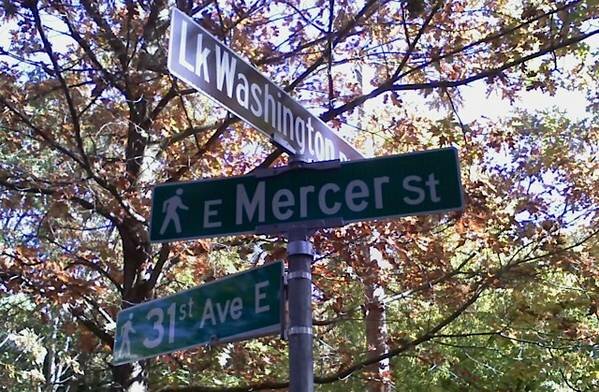 Photo courtesy of Benjamin Lukoff
Photo courtesy of Benjamin Lukoff
Reader Lucia asks: "Do you guys know what's going on with the city changing over from green street signs with white lettering to brown street signs with white lettering? This past week they have been doing it all over Queen Anne Hill."
I called SDOT about this mysterious development, and they referred me to the Parks & Recreation Dept. I left a voicemail with their communications person, but they haven't called back. Yet, I still know the answer: Brown street signs announce an Olmsted boulevard. The color-coordinated update was tucked away in our 2006 Bridging the Gap levy.
Am I a mind reader? Possibly. But in this case, I was searching on Flickr for photographic evidence of brown street signs, and contacted one Benjamin Lukoff about permission to use his brown street sign photo. Mr. Lukoff was amenable, and suggested if I was curious about them, I might like to read his comprehensive article on the topic. (In my defense, who reads Crosscut but the Gates Foundation?...
Let me say at the outset, this is a judgment call. While Seattle has been scratching its head over which of the two neophytes to choose for mayor, we can at least be glad that we're choosing between two candidates who are deeply invested in Seattle, and who each represent, in their ways, a lot of what Seattle has going for it.
I've been wrestling with which of the candidates to vote for. Even though McGinn is far and away the more knowledgeable about city politics, I still wanted to know if he could be mayor of all of Seattle, not just The Stranger.
I stopped in at a mayoral candidates debate held over the weekend at Seattle University to get an in-person read. While McGinn's anti-tunnel stance warms my heart, I'm not prepared to vote for him on that basis alone--as McGinn himself mentioned during questioning Saturday, if the deep-bore tunnel is the boondoggle he thinks it is, it may very well stop itself in its tracks.
I want to bring up the very-much-alive ghost of Governor Moonbeam because Jerry...
 Oh, corn. It's in everything we eat, we hope to power our cars with it someday, and when October rolls around, we even go play in it. Truly, Americans have a corn problem. But of the three, the last really is the best: October is prime agritainment time, with corn mazes opening up around the region offering a fine excuse to get out of the city on the weekend, whether you've got kids or not.
Oh, corn. It's in everything we eat, we hope to power our cars with it someday, and when October rolls around, we even go play in it. Truly, Americans have a corn problem. But of the three, the last really is the best: October is prime agritainment time, with corn mazes opening up around the region offering a fine excuse to get out of the city on the weekend, whether you've got kids or not.
For a lot of people, a corn maze and pumpkin patch sounds like family-friendly hell if you don't have kids, but the truth is, they're actually a great way to spend a weekend day, and an excuse to get a better pumpkin than you can find at Safeway. There's basically three types of people who go to the mazes: horny local teens (who come out in droves for "haunted" mazes nearer Halloween, which are never worth the effort), families, and hip urbanites.
There's a lot of variation between "corn mazes," some of which aren't really mazes at all. And while five years ago plenty of farms offered little more than a roadside fruit stand...
This is charming. It's a fast-motion tour of Seattle destination spots. Well, that particular Starbucks is just a Starbucks. If any of you want to post your "Best of Seattle" video response, let me know. I'll post it.
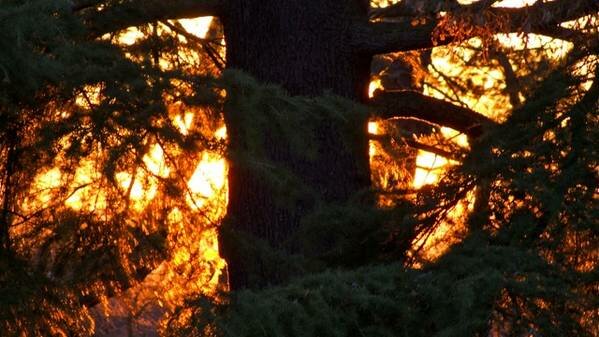

Most Recent Comments